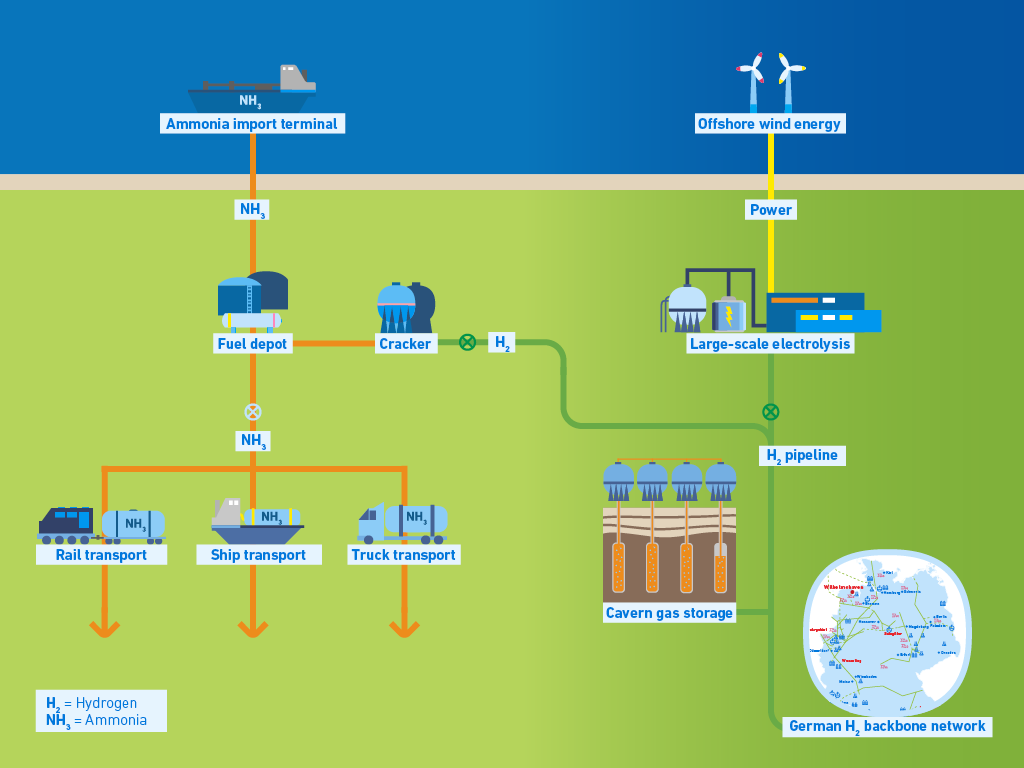Advantages of Hydrogen and Its Derivatives for Decarbonization
Green ammonia imports will enable Uniper to cover one tenth of Germany's future annual hydrogen demand
The market forecast published by the German government in the National Hydrogen Strategy 2020 predicts that the annual demand for hydrogen will reach 120 terawatt hours (TWh), or three million tons, by 2030. Uniper plans to produce ten percent of this via its Energy Transformation Hub Northwest in Wilhelmshaven, equating to 1000 tons per day. While hydrogen is initially intended for use mainly in the semiconductor, chemical and steel industries, it could later be used wherever natural gas is needed. An important prerequisite is making sure that the natural gas network can be used to supply hydrogen to private homes in the future.
"In Germany, our advantage is that we have a very well-developed natural gas network. Countries such as Sweden and Finland, which predominantly use district or pellet heating, need to build entire systems from scratch. Here in Germany, we simply need to convert the existing systems to hydrogen," says Dr. Dennis Krieg, Team Lead for Hydrogen Technologies & Logistics at Uniper. This means that Germany is well equipped to achieve its climate goals. Uniper is already advancing decarbonization with several projects.
Hydrogen will play a key role in the energy transition. This is why Uniper is also working hard on an ammonia (NH3) import terminal as part of the Energy Transformation Hub Northwest in Wilhelmshaven. Ammonia is not fed into the natural gas network, but is instead used as a transport medium to enable hydrogen to be shipped to Germany from various regions around the world. This is because when hydrogen is combined with nitrogen, ammonia is produced. Using ammonia to supply hydrogen offers significant advantages in contrast to other methods that are very energy-intensive and complicated.
Firstly, ammonia has a high energy density, meaning that it can be transported cost-effectively by ship in large quantities. Secondly, the underlying hydrogen can be purchased cheaply from various sources such as the Middle East, Namibia, Chile, Australia and Canada, which ensures a certain degree of independence from individual states. Ammonia produced abroad is also green ammonia, which is produced from renewables — mainly solar and wind energy, but also hydropower.
Once the ammonia arrives in Wilhelmshaven, Uniper plans to convert 80 percent of the NH3 back into hydrogen by means of a cracker plant, with the remaining 20 percent being supplied by rail to the nitrogen and plastics industries, for example. There, ammonia is used in air-conditioning systems and for the production of fertilizers. In these industries, ammonia is already an established substance that has been used for around 100 years. In the future, when the demand for hydrogen increases, 95 to 98 percent of imported ammonia will be cracked.
"Both the supply of hydrogen by means of ammonia and the production of hydrogen using electrolysis offer great opportunities and complement each other. This allows us to import large quantities of hydrogen in the form of ammonia via the terminal, without putting strain on the power grid for the production of hydrogen by electrolysis. The Uniper electrolysis plant, which is also planned in Wilhelmshaven, ensures even greater independence and can be operated very flexibly. Green electricity from the offshore wind farms in the North Sea will be used to produce hydrogen," said Krieg, who is also General Project Manager of the NH3 import terminal.
This blog post is part of a series on Uniper's activities related to the "Energy Transformation Hub Northwest" project.




As a career Chlorine technologist, I have been producing and utilising Hydrogen all along to produce Hydrochloric Acid etc.
I congratulate and wish Uniper a great deal of success ahead. You will be laying foundations to a universal turning point of cleaner & greener energy for a very very long time to come. So long as oceans exist, rains fall and natural springs keep showering us with water, we can rely on this gift of nature.
With kind Regards from Sydney,
M.khalid khan,
+61 411 966 606,
[email protected]